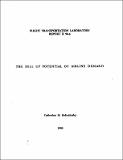The sell up potential of airline demand
Author(s)
Bohutinsky, Catherine H.
DownloadFTL_R_1990_04.pdf (5.190Mb)
Other Contributors
Massachusetts Institute of Technology. Flight Transportation Laboratory
Metadata
Show full item recordAbstract
Differential pricing of air transportation plays an important role in the current theories of airline seat inventory management. The ability to recognize those passengers willing to "sell up". or pay more for a seat on a given flight is also important, yet it has received little research attention. The proper detection and booking management of these passenger types can allow air carriers to realize higher flight revenues. This dissertation begins with an overview of airline pricing policies and seat inventory control management practices. Current fare structures and fare class designations are described in detail. Airline demand and consumer utility measures are then presented. Consumer behavior during the booking process. particularly in relation to sell up behavior, is discussed. Price elasticities of demand also play an important role in the prediction of sell up behavior. An in-depth description of sell up and its measurement follow. Once specific flights have been identified as having sell up potential, a sell up strategy can be implemented. Methods of testing the revenue benefits/costs of a particular sell up strategy were developed and used in an actual airline environment. A study consisting of a preliminary sell up test followed by an expanded study incorporating different sell up strategies was performed. Revenue results of the sell up strategies are presented and the impacts of each policy are discussed. Price elasticities of demand were estimated for individual fare classes. In general, sell up was found to be flight specific and more prevalent in the highest two fare classes (in terms of fare values) while being almost non-existent in lower fare classes.
Description
1990 Also issued as an M.S. thesis Massachusetts Institute of Technology, Dept. of Civil Engineering, 1990 Includes bibliographical references (p. 106-107)
Date issued
1990Publisher
Cambridge, Mass. : Massachusetts Institute of Technology, Dept. of Aeronautics & Astronautics, Flight Transportation Laboratory, [1990]
Other identifiers
22378079
Series/Report no.
FTL report (Massachusetts Institute of Technology. Flight Transportation Laboratory) ; R90-4
Keywords
Airlines, Demand (Economic theory), Rates, Mathematical models, Reservation systems, Marketing